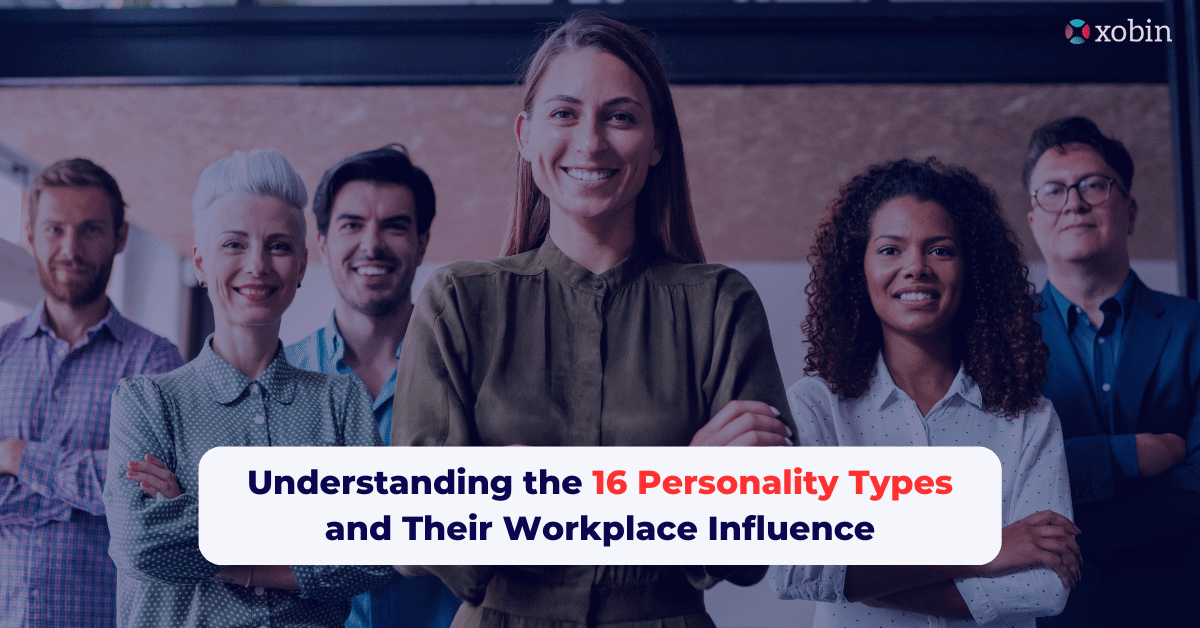Every employee brings a unique personality to the workplace, shaping team dynamics, leadership styles, and productivity. The 16 personality types, based on the Myers-Briggs Type Indicator (MBTI), offer deep insights into how individuals think, work and interact with others. Understanding these 16 personality types is a game-changer. It helps in hiring the right talent, fostering better teamwork, and ensuring long-term employee satisfaction. Whether you’re looking for a visionary leader, a detail-oriented analyst or a creative problem-solver, knowing personality types can significantly enhance your recruitment strategy. With tools like psychometric testing, businesses can make data-driven hiring decisions, ensuring a perfect fit for every role. In this blog, we will break down each of the 16 personality types and explore how they impact workplace behavior. Let’s dive in!
Table of Contents
What are the 16 Personality Types?
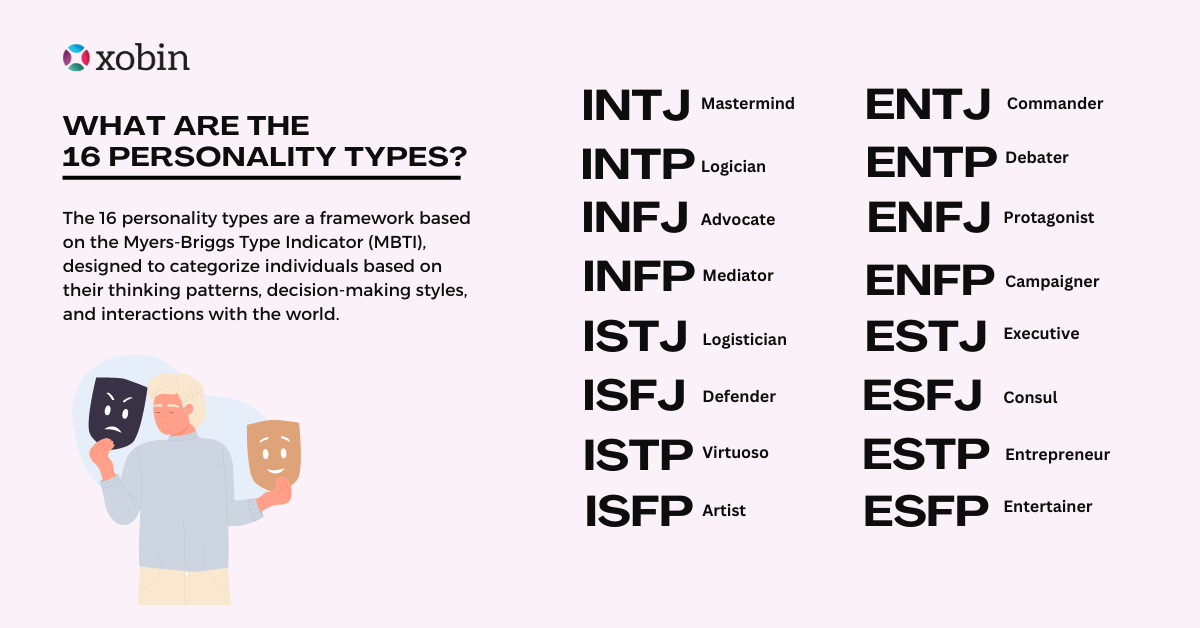
The 16 personality types are a framework based on the Myers-Briggs Type Indicator (MBTI), designed to categorize individuals based on their thinking patterns, decision-making styles, and interactions with the world. This system helps recruiters and employers understand how these personalities contribute to the workplace.
Each personality type is determined by four key dimensions:
- Introversion (I) vs. Extraversion (E) – How individuals gain energy (internally vs. externally)
- Sensing (S) vs. Intuition (N) – How individuals process information (practical vs. abstract)
- Thinking (T) vs. Feeling (F) – How individuals make decisions (logic vs. emotions)
- Judging (J) vs. Perceiving (P) – How individuals approach structure (organized vs. flexible)
By combining these traits, we get 16 personality types represented by a four-letter code (e.g., INTJ, ESFP) and is grouped into four categories:
- Analysts – Strategic thinkers who rely on logic and innovation.
- Diplomats – Empathetic leaders who value harmony and idealism.
- Sentinels – Practical and organized individuals who prioritize stability.
- Explorers – Spontaneous and adaptable individuals who embrace change.
Understanding the Four MBTI Dichotomies for Workplace Success
1. Extraversion (E) vs. Introversion (I)
| Extraversion (E) | Introversion (I) |
| Extraverts are outgoing, energetic, and thrive in social settings. They enjoy engaging with others and feel energized by interactions and external activities. Their ability to connect with people makes them well-suited for roles that require teamwork, communication, and collaboration. Consequently, they often excel in sales, public relations, and leadership positions, where interpersonal engagement is crucial. | In contrast, introverts are more reserved, reflective, and prefer solitary activities. They recharge by spending time alone and may find prolonged social interactions draining. However, their strength lies in their ability to focus deeply on tasks that require independent work, concentration, and attention to detail. As a result, they succeed in research, writing, and technical fields, where introspection and deep analysis are essential. |
Significance: Recognizing the balance between extraverts and introverts is key to building effective teams. While extraverts drive social initiatives and foster team spirit, introverts provide thoughtful insights and analytical depth. Assigning tasks based on these natural inclinations enhances productivity and workplace satisfaction.
2. Sensing (S) vs. Intuition (N)
| Sensing (S) | Intuition (N) |
| Individuals with a sensing preference focus on the present and rely on concrete facts. They are detail-oriented, practical, and prefer real-world experiences over abstract concepts. Their precision makes them ideal for roles that require accuracy and adherence to procedures. Consequently, they excel in fields such as accounting, engineering, and healthcare, where attention to detail is critical. | On the other hand, intuitive individuals think abstractly and focus on future possibilities. They enjoy exploring ideas, brainstorming, and envisioning the bigger picture. Their innovative mindset allows them to thrive in roles that require strategic thinking and creativity. Fields such as marketing, strategic planning, and research and development greatly benefit from their ability to generate new ideas and anticipate trends. |
Significance: A well-balanced team needs both practical thinkers and visionaries. While sensors ensure that plans remain grounded in reality, intuitives bring innovation and forward-thinking strategies. By leveraging both strengths, organizations can develop well-rounded solutions and drive long-term success.
3. Thinking (T) vs. Feeling (F)
| Thinking (T) | Feeling (F) |
| Thinkers prioritize logic, objectivity, and consistency in decision-making. They rely on impersonal analysis and value principles over emotions. Their rational approach makes them ideal for roles that require critical thinking, problem-solving, and impartiality. Fields such as law, finance, and science benefit from their logical decision-making abilities. | In contrast, feelers make decisions based on emotions, values, and interpersonal considerations. They prioritize harmony, empathy, and ethical concerns, often ensuring that the human impact of decisions is taken into account. Their strengths make them well-suited for roles that require strong interpersonal skills and emotional intelligence. As a result, they thrive in fields such as counseling, human resources, and customer service, where understanding and addressing emotions are crucial. |
Significance: Both objective analysis and empathetic decision-making are necessary in a workplace. Thinkers contribute structured reasoning and fairness, while feelers foster a supportive and people-centric environment. A balance between these traits creates a workplace that is both efficient and emotionally intelligent.
4. Judging (J) vs. Perceiving (P)
| Judging (J) | Perceiving (P) |
| Individuals with a judging preference prefer structure, organization, and clear planning. They work best with defined goals and deadlines, ensuring tasks are completed efficiently. Their ability to bring order and predictability makes them excel in project management, administration, and leadership roles. | On the other hand, perceivers value flexibility and adaptability. They enjoy spontaneity and are open to new experiences, making them well-suited for dynamic environments. Their problem-solving skills and creativity help them succeed in fields such as journalism, emergency response, and the creative arts, where quick thinking and innovation are essential. |
Significance: A well-functioning team needs both structure and adaptability. While judgers ensure tasks are completed on time, perceivers provide the flexibility to respond to changing circumstances. This combination allows organizations to remain stable while adapting to new challenges effectively.
Breakdown of 16 Personality Types at Workplace
THE ANALYSTS (NT – INTUITIVE THINKERS)
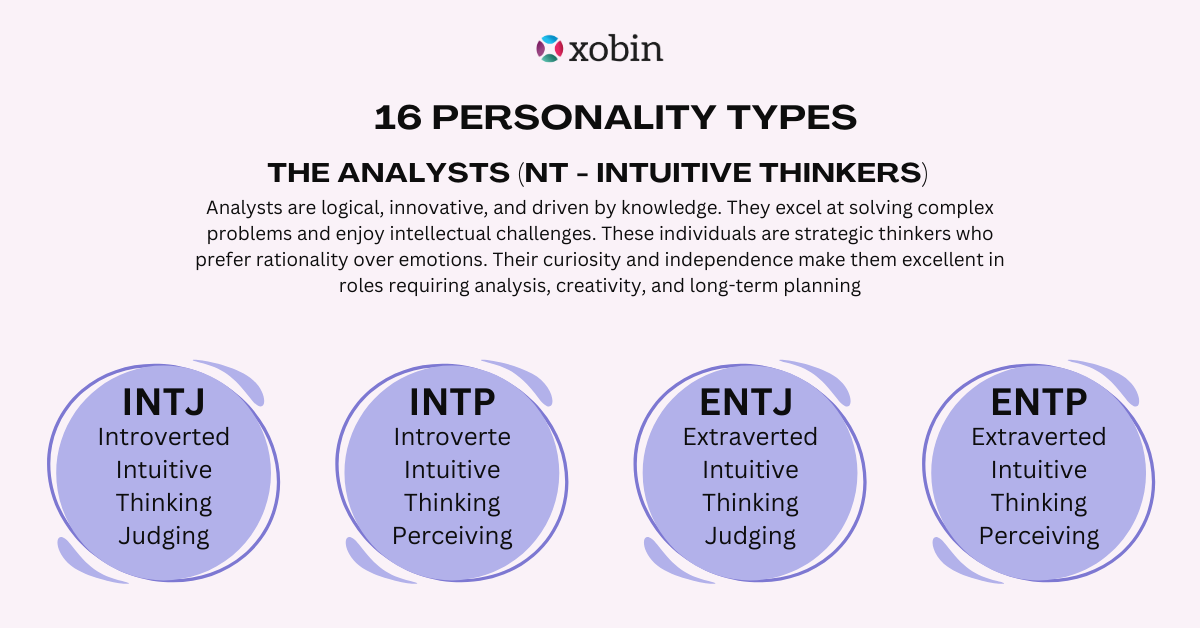
1. INTJ: Introverted, Intuitive, Thinking, Judging – The Mastermind
INTJs are independent, strategic, and highly analytical individuals. They thrive in structured environments where they can develop innovative solutions and implement long-term plans. Preferring logic over emotions, INTJs excel in decision-making and problem-solving. Their natural inclination toward efficiency makes them valuable in roles that require foresight and leadership. However, their high expectations can sometimes make them appear distant or overly critical. They prefer autonomy and work best in careers such as research, technology, and executive leadership.
You can use 16 Personality Types Test to assess INTJ personalities.
Workplace Influence: INTJs bring structure and long-term vision to organizations. Their ability to plan strategically ensures that teams stay on track toward their goals. However, their preference for independent work may make team collaboration challenging at times.
2. INTP: Introverted, Intuitive, Thinking, Perceiving – The Logician
INTPs are curious, analytical, and highly independent thinkers. They thrive in roles that allow them to explore theories and develop innovative ideas. These individuals enjoy solving complex problems and are drawn to scientific research, software development, and philosophy. INTPs are creative but can be disorganized, often focusing on possibilities rather than execution. They dislike routine and may struggle with deadlines. Their strong need for autonomy makes them less interested in rigid corporate structures.
You can use Critical Thinking test and Problem-Solving Test to assess INTP personalities.
Workplace Influence: INTPs drive innovation through their intellectual curiosity and analytical skills. Their ability to think outside the box leads to groundbreaking solutions. However, they may need guidance in maintaining structure and completing tasks on time.
3. ENTJ: Extraverted, Intuitive, Thinking, Judging – The Commander
ENTJs are natural leaders who thrive in high-pressure environments. They are assertive, strategic, and highly goal-oriented. These individuals excel at managing teams, optimizing processes, and driving businesses toward success. ENTJs prefer structured workplaces where efficiency and results are prioritized. Their confidence and determination make them excellent CEOs, managers, and entrepreneurs. However, they can sometimes be overly critical and impatient with those who do not meet their high standards.
You can use Leadership Test and Management Skills Assessment to assess ENTJ personalities.
Workplace Influence: ENTJs create structured, goal-driven workplaces. Their leadership ensures efficiency and productivity. However, they must balance their assertiveness with empathy to maintain a positive team culture.
4. ENTP: Extraverted, Intuitive, Thinking, Perceiving – The Debater
ENTPs are energetic, innovative, and love challenging conventional ideas. They thrive in dynamic environments where they can engage in debates and explore new possibilities. These individuals are highly charismatic and persuasive, making them great in sales, marketing, and entrepreneurship. ENTPs dislike routine and prefer flexibility in their work. Their quick thinking and ability to see multiple perspectives make them valuable problem-solvers. However, they may struggle with follow-through and become bored with repetitive tasks.
You can use Persuasion and Communication test to assess ENTP personalities.
Workplace Influence: ENTPs bring enthusiasm, creativity, and adaptability to teams. Their ability to generate new ideas and challenge existing systems leads to innovation. However, they should work on improving focus and completing long-term projects.
THE DIPLOMATS (NF – INTUITIVE FEELERS)
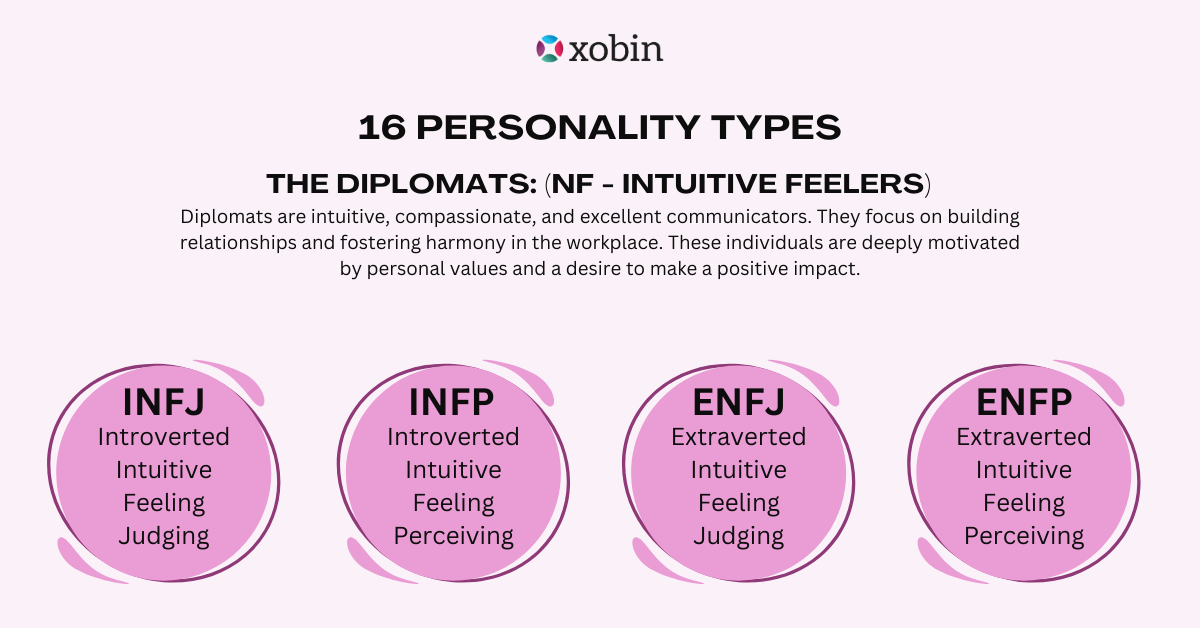
5. INFJ: Introverted, Intuitive, Feeling, Judging – The Advocate
INFJs are insightful, compassionate, and deeply committed to their values. They seek meaningful work that aligns with their beliefs and prefer roles that allow them to help others. Their strong intuition and emotional intelligence make them exceptional mentors, counselors, and HR professionals. However, INFJs can be perfectionists, which may lead to burnout. They work best in environments that encourage personal growth and purpose-driven initiatives.
You can use Leadership and Emotional Intelligence Test to assess INFJ personalities.
Workplace Influence: INFJs foster a compassionate and ethical workplace. Their ability to understand others makes them valuable in leadership and mentorship roles. However, they must set boundaries to avoid emotional exhaustion.
6. INFP: Introverted, Intuitive, Feeling, Perceiving – The Mediator
INFPs are idealistic, creative, and deeply introspective. They seek work that aligns with their personal values and allows them to express their creativity. Writing, psychology, and non-profit work appeal to their compassionate nature. However, INFPs may struggle with decision-making and dislike strict corporate environments. They perform best when given the freedom to innovate and think independently.
You can use Creativity and Problem-Solving Test to assess INFP personalities.
Workplace Influence: INFPs bring passion and authenticity to the workplace. Their ability to see the bigger picture fosters innovation and positive change. However, they may need guidance to stay focused on practical goals.
7. ENFJ: Extraverted, Intuitive, Feeling, Judging – The Protagonist
ENFJs are charismatic, inspiring, and natural leaders. They thrive in environments where they can mentor and support others. These individuals excel at bringing teams together and fostering positive relationships. ENFJs are drawn to leadership, coaching, and human resources roles. They are highly empathetic but can sometimes overextend themselves in trying to help others. Their enthusiasm and motivational skills make them excellent public speakers.
You can use Team Leader Skills Test to assess ENFJ personalities.
Workplace Influence: ENFJs create a supportive and dynamic work environment. Their ability to inspire and motivate teams leads to strong workplace culture. However, they should work on balancing their energy and setting boundaries.
8. ENFP: Extraverted, Intuitive, Feeling, Perceiving – The Campaigner
ENFPs are energetic, optimistic, and full of creative ideas. They thrive in roles that allow them to explore new possibilities and interact with people. These individuals excel in marketing, entertainment, and entrepreneurship. ENFPs dislike routine and need variety in their work to stay engaged. They are excellent at networking and inspiring others. However, they may struggle with organization and tend to jump from one idea to another.
Workplace Influence: ENFPs bring excitement, creativity, and innovation to the workplace. Their ability to generate new ideas and connect with others enhances team dynamics. However, they should focus on maintaining consistency and following through on projects.
THE SENTINELS (SJ – SENSING JUDGERS)
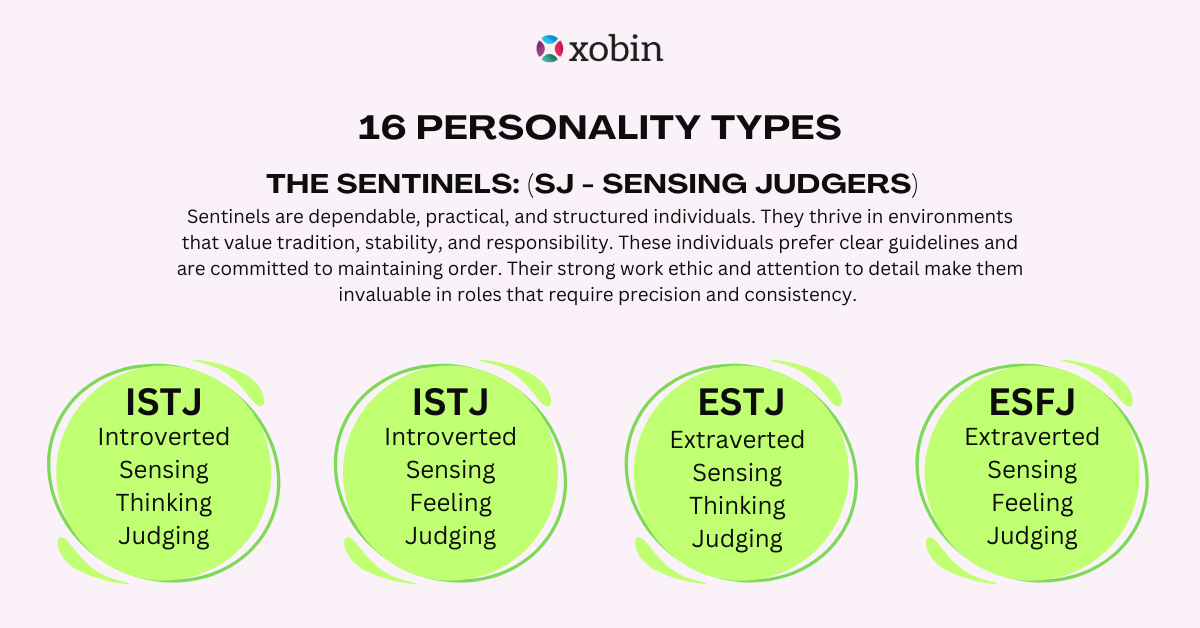
9. ISTJ: Introverted, Sensing, Thinking, Judging – The Logistician
ISTJs are highly disciplined, detail-oriented, and methodical. They thrive in structured environments where they can follow clear procedures and ensure everything runs smoothly. Their strong sense of duty and commitment to accuracy make them excellent in roles such as accounting, law enforcement, and project management. ISTJs dislike inefficiency and prefer to work independently or in well-organized teams. They value tradition and are not easily swayed by emotions, preferring logic and practicality in decision-making. However, they may struggle with adapting to sudden changes or unconventional approaches.
Workplace Influence: ISTJs provide stability and order in any organization. Their ability to enforce rules and maintain high standards ensures efficiency and reliability. Their systematic approach ensures that tasks are completed with precision. However, they may need to be more open to innovation and flexibility in fast-changing environments.
10. ISFJ: Introverted, Sensing, Feeling, Judging – The Defender
ISFJs embody warmth, responsibility, and dedication in everything they do. They take pride in assisting others and ensuring seamless operations behind the scenes. Their keen attention to detail and reliability make them ideal for careers in healthcare, education, and administration. Since they thrive in structured environments, they often avoid confrontation and prioritize others’ needs over their own. Although they collaborate well in teams, taking on too many responsibilities can lead to stress. Stability matters to them, and they perform best in supportive workplaces where they feel valued and appreciated..
You can use Psychometric Assessment to assess ISFJ personalities.
Workplace Influence: ISFJs create a nurturing and organized work environment. Their dedication to quality and helping others makes them invaluable team players. Their empathetic nature enhances workplace harmony and team cohesion. However, they need to learn to set boundaries to avoid burnout.
11. ESTJ: Extraverted, Sensing, Thinking, Judging – The Executive
ESTJs are confident, organized, and natural leaders. They excel in managerial and leadership roles where they can implement structure and enforce rules. Their direct and pragmatic approach makes them highly effective in business, government, and law. They value efficiency and expect their teams to meet high standards. However, ESTJs can sometimes come across as overly strict or inflexible. They prefer traditional methods and may struggle with adapting to unconventional work styles.
You can use Senior Vice President Test or CEO test to assess ESTJ personalities.
Workplace Influence: ESTJs bring strong leadership and structure to any organization. Their ability to manage people and processes ensures productivity. Their straightforward communication style keeps teams focused on goals. However, they should work on balancing authority with empathy to maintain positive team relationships.
12. ESFJ: Extraverted, Sensing, Feeling, Judging – The Consul
ESFJs are social, supportive, and highly attuned to the needs of others. They thrive in team-oriented environments and enjoy creating a harmonious workplace. Their strong people skills make them excellent in human resources, teaching, and healthcare. ESFJs are detail-oriented and prefer following established rules. They excel at organizing events, managing teams, and ensuring everyone feels included. However, they may struggle with criticism and have difficulty adapting to change.
Workplace Influence: ESFJs enhance workplace morale with their warmth and ability to bring people together. Their organizational skills ensure smooth operations. Their strong sense of responsibility keeps teams well-coordinated. However, they should work on handling feedback objectively and embracing new ideas.
THE EXPLORERS (SP – SENSING PERCEIVERS)
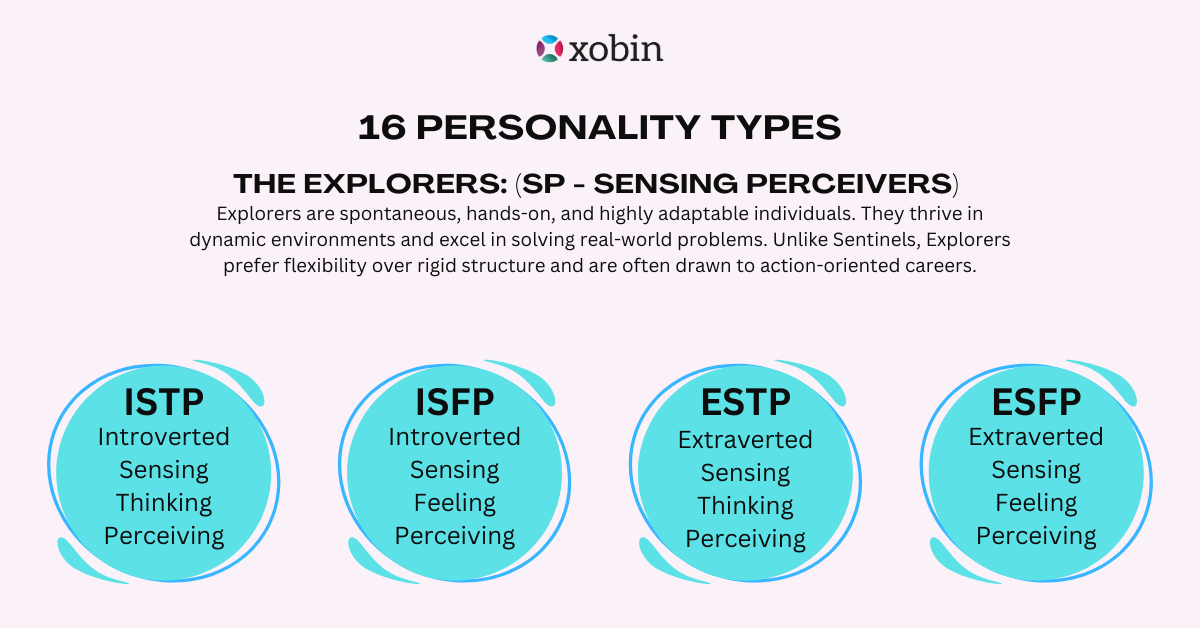
13. ISTP: Introverted, Sensing, Thinking, Perceiving – The Virtuoso
ISTPs are practical, analytical, and highly skilled at troubleshooting. They enjoy working with their hands and have a natural talent for understanding how things work. Whether it’s fixing machines, coding software, or designing innovative solutions, ISTPs excel in technical and engineering fields. They dislike rigid structures and prefer working independently. ISTPs are quick thinkers and remain calm under pressure, making them great problem-solvers in crisis situations. However, they may struggle with long-term planning and tend to lose interest in repetitive tasks.
Workplace Influence: ISTPs bring hands-on expertise and innovative problem-solving skills to any team. Their ability to think quickly under pressure makes them invaluable in technical roles. Their adaptability allows them to excel in fast-paced environments. However, they may need guidance in setting long-term goals and improving collaboration.
14. ISFP: Introverted, Sensing, Feeling, Perceiving – The Artist
ISFPs are creative, sensitive, and deeply in tune with their emotions. They thrive in artistic and hands-on professions such as design, photography, music, and fashion. Their natural sense of aesthetics allows them to bring beauty and innovation to their work. ISFPs dislike strict rules and prefer working at their own pace. They are independent thinkers who enjoy exploring new experiences. However, they may struggle with structure and long-term planning.
Workplace Influence: ISFPs add creativity and originality to the workplace. Their artistic vision enhances innovation and inspires others. However, they may need structure and deadlines to keep projects on track.
15. ESTP: Extraverted, Sensing, Thinking, Perceiving – The Entrepreneur
ESTPs are energetic, adventurous, and action-oriented. They thrive in fast-paced environments where they can take risks and think on their feet. Their charisma and confidence make them excellent in sales, marketing, and entrepreneurship. They enjoy problem-solving and are quick decision-makers. However, ESTPs may struggle with long-term commitments and tend to focus on immediate results rather than future planning. They dislike rigid routines and prefer a hands-on approach to learning.
You can use Sales and Negotiation Skills Test to assess ESTP personalities.
Workplace Influence: ESTPs bring enthusiasm and adaptability to the workplace. Their ability to make quick decisions and seize opportunities drives business success. Their fearless attitude allows them to take calculated risks that benefit the company. However, they may need help with follow-through and long-term strategy.
16. ESFP: Extraverted, Sensing, Feeling, Perceiving – The Entertainer
ESFPs are fun-loving, social, and highly charismatic individuals. They bring excitement and positive energy to any environment. ESFPs enjoy working with people and excel in roles such as entertainment, public relations, and event planning. They are natural performers who thrive on interaction and spontaneity. However, they can struggle with discipline and tend to avoid routine or highly structured work. They prefer a lively, engaging work atmosphere where they can express themselves freely.
Workplace Influence: ESFPs create an energetic and engaging workplace. Their ability to connect with others and boost team morale makes them excellent in customer-facing roles. However, they should work on maintaining focus and meeting deadlines.
Assess Personalities with Xobin’s 16 Personality Types Test
Recruiters and hiring managers need accurate insights into candidates’ personalities to build strong, well-balanced teams. With Xobin’s 16 Personality Test, you can effectively evaluate candidates based on their behavioral traits, decision-making styles, and workplace compatibility.
- Scientifically Validated: Based on the MBTI framework, ensuring reliable personality insights.
- Easy Integration: Seamlessly integrates with your hiring process for quick and accurate results.
- Workplace-Relevant Insights: Understand how candidates perform in teamwork, leadership, problem-solving, and adaptability.
- Better Hiring Decisions: Match candidates with roles that fit their strengths and work style.
Use Xobin’s 16 Personality Types Online Test to match the right candidates to the right roles. Book a Personalized Demo today!
